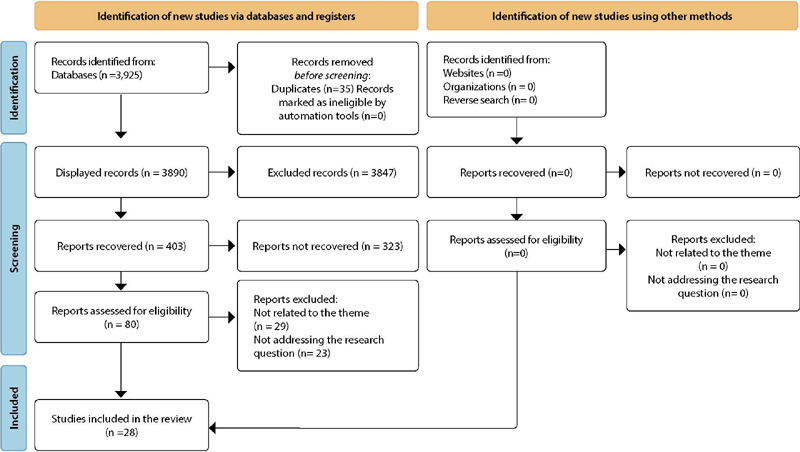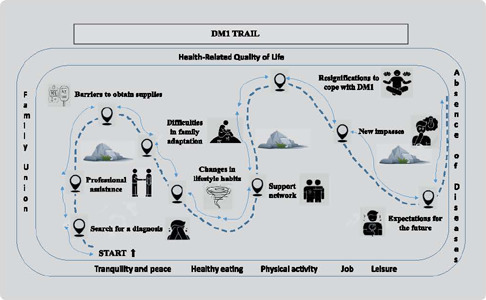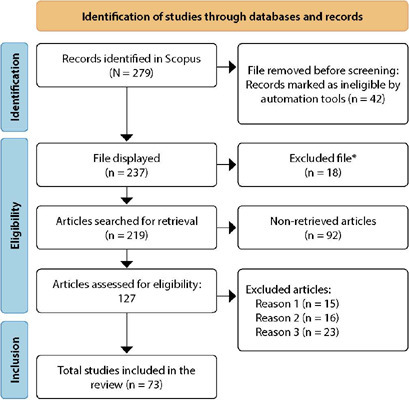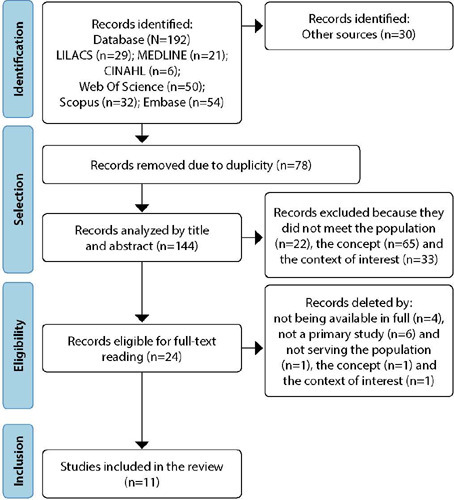-
03-08-2024
A enfermagem como protagonista no enfrentamento da hesitação e recusa vacinal
Revista Brasileira de Enfermagem. 2024;77:e77suppl101
Abstract
A enfermagem como protagonista no enfrentamento da hesitação e recusa vacinal
Revista Brasileira de Enfermagem. 2024;77:e77suppl101
DOI 10.1590/0034-7167.202477suppl101pt
Views0Desde a década de 1970, o Ministério da Saúde do Brasil instituiu o Programa Nacional de Imunização (PNI), que precedeu o Sistema Único de Saúde e que lhe foi incorporado e fortalecido, devido ao modelo descentralizado aos municípios, mas de comando único ao nível central. Seu objetivo era e ainda é coordenar as ações de […]See more -
03-08-2024
Nursing as a player in tackling vaccine hesitancy and refusal
Revista Brasileira de Enfermagem. 2024;77:e77suppl101
Abstract
Nursing as a player in tackling vaccine hesitancy and refusal
Revista Brasileira de Enfermagem. 2024;77:e77suppl101
DOI 10.1590/0034-7167.202477suppl101
Views1Since the 1970s, the Brazilian Ministry of Health established the Brazilian National Immunization Program (PNI – Programa Nacional de Imunização), which preceded the Brazilian Health System and which was incorporated and strengthened due to the decentralized model to municipalities, but under single command at central level. Its objective was and still is to coordinate vaccination […]See more -
02-26-2024
Enfermeiro Navegador de Pacientes com Câncer: contribuições para a discussão no cenário nacional
Revista Brasileira de Enfermagem. 2024;77(2):e770201
Abstract
Enfermeiro Navegador de Pacientes com Câncer: contribuições para a discussão no cenário nacional
Revista Brasileira de Enfermagem. 2024;77(2):e770201
DOI 10.1590/0034-7167.2024770201pt
Views0A prática profissional da navegação de pacientes é algo incipiente no Brasil e, sendo assim, é indispensável uma ampla discussão com vários setores da sociedade, sendo essa a principal propositura deste editorial. Comecemos pela história.A navegação de pacientes foi definida em 1989 como uma intervenção de prestação de serviços baseada na comunidade, com o objetivo […]See more -
02-26-2024
Nurse Navigator of Cancer Patients: contributions to the discussion on the national stage
Revista Brasileira de Enfermagem. 2024;77(2):e770201
Abstract
Nurse Navigator of Cancer Patients: contributions to the discussion on the national stage
Revista Brasileira de Enfermagem. 2024;77(2):e770201
DOI 10.1590/0034-7167.2024770201
Views0The professional practice of patient navigation is incipient in Brazil and, therefore, a broad discussion with various sectors of society is essential, which is the main purpose of this editorial. Shall we start with the story.Patient navigation was defined in 1989 as a community-based service delivery intervention aimed at appropriately promoting access to diagnosis and […]See more -
ERRATUM02-26-2024
ERRATUM
Revista Brasileira de Enfermagem. 2024;77(1):e2024n1e02
Abstract
ERRATUMERRATUM
Revista Brasileira de Enfermagem. 2024;77(1):e2024n1e02
DOI 10.1590/0034-7167.20247701e02
Views0In the article “Active teaching model to promote critical thinking”, with DOI number: , published in Revista Brasileira de Enfermagem, 2019;72(1):293-8, on page 297:Include before REFERENCES:[…]See more -
REVIEW02-26-2024
Practice of immersion in hot water to relieve pain in neonatology: an integrative review
Revista Brasileira de Enfermagem. 2024;77(1):e20230260
Abstract
REVIEWPractice of immersion in hot water to relieve pain in neonatology: an integrative review
Revista Brasileira de Enfermagem. 2024;77(1):e20230260
DOI 10.1590/0034-7167-2023-0260
Views0See moreABSTRACT
Objectives:
to identify immersion use in hot water to relieve pain in newborns.
Methods:
an integrative literature review, carried out in the PubMed, VHL, EMBASE, Scopus, CINAHL, Cochrane and SciELO databases, with investigations in English, Spanish, French or Portuguese, published between 2002 and 2022. The Health Sciences Descriptors (DeCS) and Medical Subject Headings (MeSH) were used to answer the following question: what are the uses of hot water immersion in relieving pain in newborns?
Results:
nine studies were included, mainly Brazilian, experimental, with a predominance of strong and moderate levels of evidence. Hydrotherapy and bath use (immersion and bandaging) was observed, promising interventions in reducing pain scores, assessed using scales, physiological and endocrine parameters.
Conclusions:
hot water proved to be a promising non-pharmacological intervention in relieving pain in infants in different contexts.

-
ORIGINAL ARTICLE02-26-2024
Artificial intelligence to predict bed bath time in Intensive Care Units
Revista Brasileira de Enfermagem. 2024;77(1):e20230201
Abstract
ORIGINAL ARTICLEArtificial intelligence to predict bed bath time in Intensive Care Units
Revista Brasileira de Enfermagem. 2024;77(1):e20230201
DOI 10.1590/0034-7167-2023-0201
Views0See moreABSTRACT
Objectives:
to assess the predictive performance of different artificial intelligence algorithms to estimate bed bath execution time in critically ill patients.
Methods:
a methodological study, which used artificial intelligence algorithms to predict bed bath time in critically ill patients. The results of multiple regression models, multilayer perceptron neural networks and radial basis function, decision tree and random forest were analyzed.
Results:
among the models assessed, the neural network model with a radial basis function, containing 13 neurons in the hidden layer, presented the best predictive performance to estimate the bed bath execution time. In data validation, the squared correlation between the predicted values and the original values was 62.3%.
Conclusions:
the neural network model with radial basis function showed better predictive performance to estimate bed bath execution time in critically ill patients.
-
REVIEW02-26-2024
Evidence of intrauterine device insertion by nurses in Primary Health Care: an integrative review
Revista Brasileira de Enfermagem. 2024;77(1):e20230134
Abstract
REVIEWEvidence of intrauterine device insertion by nurses in Primary Health Care: an integrative review
Revista Brasileira de Enfermagem. 2024;77(1):e20230134
DOI 10.1590/0034-7167-2023-0134
Views0See moreABSTRACT
Objectives:
to synthesize and analyze evidence on intrauterine device insertion by nurses in Primary Health Care.
Methods:
an integrative review, carried out in the BDENF, CINAHL, LILACS, SciELO, Scopus, PubMed and Web of Science databases in June 2022, delimiting the period from 1960 to 2022.
Results:
141 articles were identified in the initial search, and 10 studies made up the final sample. Four (40%) were developed in the United States and one (10%) in Brazil, with publications from 1979 to 2021. The findings were grouped into three categories: Nurse training to insert an intrauterine device; Nurses’ competency to insert an intrauterine device; and Women’s access to intrauterine devices.
Conclusions:
nurse theoretical and practical training is a prominent element, consolidated in the favorable outcomes of insertions performed by nurses and satisfaction among women, a practice that has expanded access to the contraceptive method in Primary Health Care.

-
ORIGINAL ARTICLE06-14-2024
Mid-range theory of the nursing diagnosis Overweight
Revista Brasileira de Enfermagem. 2024;77(2):e20230372
Abstract
ORIGINAL ARTICLEMid-range theory of the nursing diagnosis Overweight
Revista Brasileira de Enfermagem. 2024;77(2):e20230372
DOI 10.1590/0034-7167-2023-0372
Views0See moreABSTRACT
Objective:
To build a mid-range theory for the nursing diagnosis Overweight in adolescents and young adults.
Methods:
A methodological study in the light of the theoretical frameworks of Roy and of Lopes, Silva and Herdman. A total of 3,925 articles were retrieved and assessed using the State of the Art Through Systematic Review software. The final sample consisted of 28 articles.
Results:
The findings converged to 3 essential attributes, 13 antecedents, and 7 consequences. A mid-range theory was built consisting of an illustrated diagram, 11 propositions, and 12 causal relationships.
Final considerations:
From the creation of the theory, it was possible to better understand the nursing diagnosis Overweight within the context of adolescents and young adults. Understanding nursing phenomena contributes to nursing science’s advancement and strengthening.

-
ORIGINAL ARTICLE06-14-2024
The (in)visibility of fibromyalgia through its symptoms and the challenges of its diagnosis and therapy
Revista Brasileira de Enfermagem. 2024;77(2):e20230363
Abstract
ORIGINAL ARTICLEThe (in)visibility of fibromyalgia through its symptoms and the challenges of its diagnosis and therapy
Revista Brasileira de Enfermagem. 2024;77(2):e20230363
DOI 10.1590/0034-7167-2023-0363
Views0See moreABSTRACT
Objective:
To analyze the social representations of fibromyalgia based on its symptoms and their influences on diagnosis and therapy.
Methods:
Qualitative research with the application of the Theory of Social Representations and snowball sampling method. Semi-structured interviews were conducted with 30 adults diagnosed with fibromyalgia in the city of Rio de Janeiro, Brazil, between April 2020 and January 2021. Statistical and lexicographical analysis was performed using Alceste software.
Results:
Pain, as a subjective phenomenon, complicates its legitimacy, diagnosis, and therapy, enhancing suffering. Insufficient information generates judgments, stereotypes, and prejudices.
Final Considerations:
Stigmas, prejudices, the variety and invisibility of symptoms make it difficult to objectify the disease within the Cartesian-biomedical frameworks, generating diagnostic pilgrimage, mistakes, and challenges in treatment. Such representations hinder relationships and the management of the disease. Deconstructing them is a way to better care for those with fibromyalgia. Raising awareness and spreading qualified information are important allies.
-
ORIGINAL ARTICLE06-14-2024
Cardiovascular Risk and Lifestyle: comparison between teaching workers in Portugal and Brazil
Revista Brasileira de Enfermagem. 2024;77(2):e20230354
Abstract
ORIGINAL ARTICLECardiovascular Risk and Lifestyle: comparison between teaching workers in Portugal and Brazil
Revista Brasileira de Enfermagem. 2024;77(2):e20230354
DOI 10.1590/0034-7167-2023-0354
Views0See moreABSTRACT
Objective:
Compare Cardiovascular Risk between workers in Brazil and Portugal who work in the teaching context and its relationship with Lifestyle and Common Mental Disorder.
Methods:
Cross-sectional study that compared the cardiovascular health conditions of teaching workers in Manaus (Brazil) and Coimbra (Portugal). The odds ratio between groups was estimated.
Results:
The differences were: Smoking and hypercholesterolemia in participants from Portugal. Hypertension, chronic disease, increased abdominal perimeter, common mental disorder, and absence from work in Brazil. The variables with the greatest effect for high cardiovascular risk were: Country-Portugal [17.273 (95%CI1.538-193.951)], sex-male [61.577 (95%CI5.398-702.469)] and smoking [593.398 (95%CI57.330-6.142.020)].
Conclusion:
The differences in risk between groups showed that participants from Portugal, men, with high blood pressure and/or smokers are the most vulnerable to having a cardiovascular event. There is a need for interventions to promote cardiovascular health in the workplace in both countries.
-
ORIGINAL ARTICLE06-14-2024
Functional performance assessment scale for children and adolescents with cancer: cross-cultural study
Revista Brasileira de Enfermagem. 2024;77(2):e20230331
Abstract
ORIGINAL ARTICLEFunctional performance assessment scale for children and adolescents with cancer: cross-cultural study
Revista Brasileira de Enfermagem. 2024;77(2):e20230331
DOI 10.1590/0034-7167-2023-0331
Views0See moreABSTRACT
Objectives:
to describe the methodological process of cross-cultural adaptation of the PlayPerformance Scale for Children to Brazilian Portuguese.
Methods:
methodological study of translation and cross-cultural adaptation in six stages: translation, synthesis of translations, back-translation, evaluation by a committee of judges, evaluation by expert nurses, and pretest. The agreement and representativeness of the items were assessed using the content validity index. A minimum value of 80% agreement was considered.
Results:
all stages of the translation and cross-cultural adaptation process were satisfactory. In the evaluation performed by the committee of judges, all items obtained agreement above 80%. Fifteen pediatric nurses conducted the content validation, suggesting necessary modifications for understanding and application. Thirty children and adolescents with cancer were assessed with the scale for the pre-test.
Conclusions:
the scale was cross-culturally adapted to Brazilian Portuguese. The need for psychometric testing in a consistent sample is emphasized.
-
ORIGINAL ARTICLE06-14-2024
Meanings attributed to health-related quality of life by caregivers of adolescents with diabetes
Revista Brasileira de Enfermagem. 2024;77(2):e20230314
Abstract
ORIGINAL ARTICLEMeanings attributed to health-related quality of life by caregivers of adolescents with diabetes
Revista Brasileira de Enfermagem. 2024;77(2):e20230314
DOI 10.1590/0034-7167-2023-0314
Views0See moreABSTRACT
Objective:
to interpret the meanings attributed to the health-related quality of life by caregivers of adolescents with type 1 diabetes mellitus.
Methods:
qualitative, descriptive-exploratory study of 14 caregivers of adolescents with diabetes developed at the reference outpatient clinic for endocrine diseases in a city in the state of Paraíba. Interviews were performed between May and September 2021. Inductive thematic analysis of the empirical material, and its interpretation in light of the concepts of health-related quality of life and family functioning were performed.
Results:
the meanings attributed by caregivers to the health-related quality of life of adolescents converged on the feeling of being healthy, healthy eating, satisfactory family income, family involvement in care and effective access to the care network.
Final Considerations:
knowledge of these meanings enables health professionals to develop strategies that meet the unique demands of caregivers experiencing this diagnosis.

-
REVIEW06-14-2024
Critical analysis of the scientific production on Jean Watson’s Theory of Human Care
Revista Brasileira de Enfermagem. 2024;77(2):e20230231
Abstract
REVIEWCritical analysis of the scientific production on Jean Watson’s Theory of Human Care
Revista Brasileira de Enfermagem. 2024;77(2):e20230231
DOI 10.1590/0034-7167-2023-0231
Views0See moreABSTRACT
Objectives:
to analyze current scientific production on the use of the theoretical-methodological precepts of Jean Watson’s Theory of Human Care/Clinical Caritas Process.
Methods:
quantitative, exploratory, descriptive study using data from 1979 to 2023 in the Scopus database. Analysis was carried out using VOSviewer software.
Results:
the 73 studies included establish a network of collaboration among 221 authors from 155 institutions in 18 countries, who discuss the development of ethical behavior in nursing staff, through technical improvement, implementation, and validation of instrumental strategies capable of measuring and evaluating the quality of holistic and empathetic care. The Theory of Human Caring contributes to nursing training and care, and Process Clinical Caritas-Veritas is useful for the different possibilities of practice and education.
Conclusions:
it is important to strengthen with more empirical data a nursing work model centered on individual human care, supporting the evolution of scientific nursing knowledge.

-
REVIEW06-14-2024
Primary health care professionals’ practice in the face of leprosy: a scoping review
Revista Brasileira de Enfermagem. 2024;77(2):e20230207
Abstract
REVIEWPrimary health care professionals’ practice in the face of leprosy: a scoping review
Revista Brasileira de Enfermagem. 2024;77(2):e20230207
DOI 10.1590/0034-7167-2023-0207
Views0See moreABSTRACT
Objectives:
to identify Primary Health Care professionals’ practice in the face of leprosy.
Methods:
a scoping review, carried out between November 2022 and January 2023, conducted according to the methodological structure proposed by JBI and checklist Preferred Reporting Items for Systematic Reviews and Meta-Analyses extension for Scoping Reviews in six databases and additional literature.
Results:
the sample consisted of 11 articles, published between 2008 and 2022. The findings were synthesized into three categories: Early diagnosis and timely treatment; Physical disability prevention; and Household and social contact surveillance.
Final Considerations:
there is a need to align the practices carried out with those recommended by the Brazilian National Program for Leprosy Control and Elimination, as some were not identified in studies, which implies losses to qualified assistance directed to patient demands, with a view to control and elimination of leprosy.

-
ORIGINAL ARTICLE06-14-2024
Validity of the TBApp mobile application for self-care management for people with tuberculosis
Revista Brasileira de Enfermagem. 2024;77(2):e20230195
Abstract
ORIGINAL ARTICLEValidity of the TBApp mobile application for self-care management for people with tuberculosis
Revista Brasileira de Enfermagem. 2024;77(2):e20230195
DOI 10.1590/0034-7167-2023-0195
Views1See moreABSTRACT
Objectives:
to describe the validity process of the TBApp mobile application for self-care management for people with tuberculosis linked to Primary Health Care.
Methods:
methodological research developed with ten expert judges, carried out virtually. The application was assessed in relation to content and technology quality in seven domains (objectivity; structure and appearance; relevance; functionality; reliability; usability; and efficiency), using an instrument with a Likert scale.
Results:
TBApp was considered valid, relevant, functional, reliable and effective by expert judges. The objectives, structure and presentation and relevance domains presented an overall Content Validity Index of 0.93, and the functionality, reliability, usability and efficiency domains presented characteristics and sub-characteristics values greater than 0.80.
Conclusions:
TBApp is a creative and innovative tool that can be used by people with TB and disseminated in the scientific community.
-
12-04-2023
A cronicidade e o seu impacto na saúde do trabalhador: uma chamada para ações concretas
Revista Brasileira de Enfermagem. 2023;76:e76suppl301
Abstract
A cronicidade e o seu impacto na saúde do trabalhador: uma chamada para ações concretas
Revista Brasileira de Enfermagem. 2023;76:e76suppl301
DOI 10.1590/0034-7167.202376suppl301pt
Views0A relação entre cronicidade e trabalho tem sido uma preocupação crescente na sociedade contemporânea. À medida que o número de doenças crônicas aumenta em todo o mundo, é fundamental compreender como essas condições impactam a saúde dos trabalhadores(). Neste editorial, exploraremos os impactos da cronicidade na saúde do trabalhador, destacando dados da Carga Global de […]See more -
12-04-2023
Chronicity and its impact on workers’ health: a call for concrete actions
Revista Brasileira de Enfermagem. 2023;76:e76suppl301
Abstract
Chronicity and its impact on workers’ health: a call for concrete actions
Revista Brasileira de Enfermagem. 2023;76:e76suppl301
DOI 10.1590/0034-7167.202376suppl301
Views0The relationship between chronicity and work has been a growing concern in contemporary society. As the number of chronic illnesses increases around the world, it is critical to understand how these conditions impact workers’ health(). In this editorial, we will explore the impacts of chronicity on workers’ health, highlighting data from the Global Burden of […]See more -
12-04-2023
General Law on Personal Data Protection and applicability to Nursing
Revista Brasileira de Enfermagem. 2023;76:e20230126
Abstract
General Law on Personal Data Protection and applicability to Nursing
Revista Brasileira de Enfermagem. 2023;76:e20230126
DOI 10.1590/0034-7167-2023-0126
Views0See moreABSTRACT
Objectives:
to reflect on the impacts of the General Personal Data Protection Law on Nursing practice.
Methods:
reflection article, through the intentional collection of materials relating to the topic.
Results:
legislation regulates confidentiality, processing and data sharing, requiring institutional protection measures. The nursing team is responsible for acting preventively, both in care and in the management role, in order to avoid the misuse of the patient’s personal data. The law allows academic research to be carried out as long as the purpose is clear, data collection occurs with an explicit purpose and data is anonymized.
Final Considerations:
although the General Personal Data Protection Law requires greater care in relation to data processing, it is established on precepts of good faith and respect for the rights of the individual, concepts aligned with the nursing code of ethics.

-
REVIEW12-04-2023
Supervision of professional nursing practice in Brazil: a scoping review
Revista Brasileira de Enfermagem. 2023;76:e20230077
Abstract
REVIEWSupervision of professional nursing practice in Brazil: a scoping review
Revista Brasileira de Enfermagem. 2023;76:e20230077
DOI 10.1590/0034-7167-2023-0077
Views0See moreABSTRACT
Objectives:
to map studies that analyze the audit process of nursing councils.
Methods:
this is a scoping review, anchored in the JBI framework, with the guiding question: what is the evidence of the audit process of legal practice of nursing by class councils (COFEN/COREN system)? The searches were carried out in October and November 2022 without limitation of language and year.
Results:
of the 9 selected studies, all are Brazilian and published from 2014 onwards. Among the topics addressed are the role, challenges, costs and difficulties in nurse auditors’ daily work process, in addition to the contribution of the audit sector in Brazil.
Conclusions:
the studies gathered discuss aspects related to costs, challenges and difficulties, but there is no focus on corrective, disciplinary and educational activities as well as little is said about the audit process, its reporting, referral and outcomes.

-
ORIGINAL ARTICLE12-04-2023
Overview of nursing ethics teaching in Brazilian public higher education institutions
Revista Brasileira de Enfermagem. 2023;76:e20220808
Abstract
ORIGINAL ARTICLEOverview of nursing ethics teaching in Brazilian public higher education institutions
Revista Brasileira de Enfermagem. 2023;76:e20220808
DOI 10.1590/0034-7167-2022-0808
Views0See moreABSTRACT
Objectives:
to outline the teaching of ethics in undergraduate Nursing programs in Brazilian public higher education institutions.
Methods:
descriptive and exploratory study, carried out through the documentary analysis of pedagogical projects of undergraduate Nursing programs in Brazil.
Results:
153 active undergraduate Nursing programs were found, of which 106 provide the pedagogical project. In addition to deontological teaching, the teaching of ethics was identified in a transversal way associated with themes such as Social Context, Hospital and Community Care, Pharmacology, Systematization of Nursing Care, Surgical Nursing, Epidemiology, Palliative Care, Management in Nursing, Diversity, Women’s, Children’s, Adolescent’s, Adult’s and Older People’s Health, and Mental Health.
Final Considerations:
the challenge in teaching nursing ethics is its integration with each action of caring, teaching and managing.

-
12-04-2023
La ética de la atención de enfermería a las personas transgénero
Revista Brasileira de Enfermagem. 2023;76:e20220797
Abstract
La ética de la atención de enfermería a las personas transgénero
Revista Brasileira de Enfermagem. 2023;76:e20220797
DOI 10.1590/0034-7167-2022-0797es
Views0See moreRESUMEN
Objetivos:
debatir sobre aspectos éticos en la atención de enfermería a personas transgénero.
Métodos:
estudio reflexivo fundamentado sobre los dilemas que se plantean en los cuidados de enfermería a personas transgénero. El relato se ha estructurado en torno a los cuatro principios bioéticos.
Resultados:
la atención sanitaria a las personas trans es compleja, transversal a muchos dispositivos y especialidades y longitudinal en el tiempo por lo que precisa de la actuación coordinada. Existe un marco ético en el que se encuadran los cuidados de enfermería que se precisan en la atención a este colectivo.
Consideraciones Finales:
la enfermera como agente de salud puede asumir diversas líneas generales en la atención a pacientes transgénero. Para ello, se debe brindar formación adicional no solo a los profesionales, también a los estudiantes de enfermería y de las demás ciencias de la salud.
-
12-04-2023
Ethical dilemmas at the end of life: a reflection from the Philosophical Perspective of Luigina Mortari
Revista Brasileira de Enfermagem. 2023;76:e20220759
Abstract
Ethical dilemmas at the end of life: a reflection from the Philosophical Perspective of Luigina Mortari
Revista Brasileira de Enfermagem. 2023;76:e20220759
DOI 10.1590/0034-7167-2022-0759
Views0See moreABSTRACT
Objectives:
to reflect on the ethical dilemmas involved in the care of patients at the end of their lives.
Methods:
this is a theoretical-reflective study based on the ethics of care proposed by Luigina Mortari.
Results:
discussing care involves addressing the ways of being inherent to human existence and understanding the unique characteristics of this condition. Ethical care constitutes an action driven by interest in the other and by the perception of their need. Ethical dilemmas are a part of end-of-life care, making it essential to maintain respectful assistance that considers the patient’s autonomy, using strategies for expressing their wishes, and ensuring continuous clear and empathetic communication among all those involved in providing care.
Final Considerations:
issues related to being, stemming from one’s reality of dependency and vulnerability, contribute to the emergence of ethical dilemmas present in care actions.
Search
Search in:
Nuvem de Tags
Adolescente (85) Atenção Primária à Saúde (239) COVID-19 (91) Criança (91) Cuidados de Enfermagem (269) Educação em Enfermagem (151) Educação em Saúde (139) Enfermagem (930) Enfermagem Pediátrica (86) Estudantes de Enfermagem (77) Estudos de Validação (131) Família (87) Idoso (208) Promoção da Saúde (99) Qualidade de Vida (104) Saúde do Trabalhador (86) Saúde Mental (145) Saúde Pública (82) Segurança do Paciente (150) Tecnologia Educacional (100)



